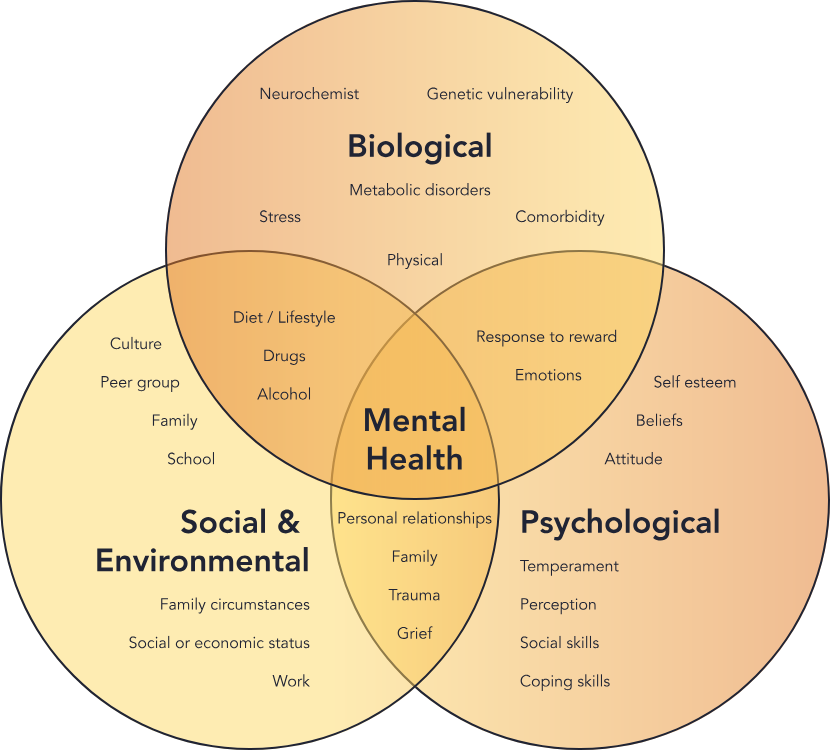Expert care to overcome mental health issues.
Get a personalized treatment plan online and start feeling like you again with medication, therapy or both.
*Call for a free and confidential assessment. Insurance may cover 100% of the cost.
What is Mental Health?
Mental illness, also called mental health disorders, refers to a wide range of mental health conditions — disorders that affect your mood, thinking, and behavior.
Mental health is unique to every one of us; it does not discriminate. Anyone can develop a mental health problem at various points within their life. However, the fantastic news is that no one has to suffer in silence if they struggle with mental health. Here at Park San Diego, we provide specialist mental health and addiction treatment for anyone who has decided to seek help.
Mental illness, also referred to as mental health disorders, is a disease that affects your mood, thinking, and behavior. Experiencing a mental illness can make you miserable and cause problems in your daily life, such as school, work, or relationships. In most cases, symptoms can be managed with a combination of medications and various therapy techniques depending on several factors. You don’t have to suffer in silence – get help today for your mental health problems.
The cycle of Mental Health
Social and Environmental: Exposure to traumatic environments, drugs, alcohol, and abuse from an early age are factors in which an individual has a significant risk of developing a combination of mental health illnesses later on in life.
Biology: If there is a history of mental illnesses in an individual family, there is an increased risk of you developing at least one mental health disorder within your lifetime. Certain genes may trigger a breakdown during a particular time in your life which will subsequently lead to you experiencing a mental health episode or long-standing disorder.
Psychology: Several psychological factors are known to contribute to mental health disorders. Individuals who have experienced awful, traumatic situations or the loss of a parent within an early point in life can significantly increase the risk of an individual developing several mental health disorders.

Mental and physical symptoms of mental health
The signs and symptoms of mental health are unique to each individual; however, there is a range of general symptoms that most individuals will experience.
Mental signs and symptoms to look out for:
- Feelings of dread
- Uncontrollable over-thinking
- Difficulties concentrating
- Feelings of dread, panic or ‘impending doom’
- Feeling irritable
- Heightened alertness
- Problems with sleep
- Loss in in appetite
- Wanting to escape
Mental signs and symptoms to look out for:
- Profusely sweating
- Heavy or fast breathing
- Hot flushes or blushing
- Dry mouth
- Shaking, dizziness and fainting
- Hair loss
- Fast heartbeat
- Extreme tiredness or lack of energy
- Wanting to escape
- Stomach aches or sharp pains
- Feeling constantly nauseous
Selfcare tips for Mental Health
Self Care activities and techniques alongside general lifestyle changes can be immensely effective in aiding individuals regarding their mental health symptoms. Additionally, looking after yourself mentally will further help you develop worse symptoms or develop an additional mental health illness. Below we have listed some tips that have greatly helped clients’ mental health. If you find these tips are effective in helping your mental health symptoms, please do not stop taking your medication or attending your therapy sessions unless instructed by a medical professional here at Park Mental Health.
Stay aware and ensure you allow yourself time to understand your mental health illness. If it helps you, ask loved ones and trusted friends if you can be open and honest with them about your mental health.
Keeping track of your moods can help you identify what situations, environments for individuals may trigger your mental health symptoms. Once you identify what causes your symptoms, you can actively change your life to halt these negative triggers.
Take the time and steps to build your self-esteem to allow yourself to feel comfortable within your mind and body. You are an outstanding, unique individual, and you need to see that within yourself. It can be beneficial to look straight in a mirror and point out everything you love about yourself, even if it is something very minor like the length of your eyelashes. Start speaking to yourself positively.
Encourage yourself to connect to your family and friends; you will be amazed at how quickly your life will start feeling more positive. Ensure the members you connect with are positive individuals that will support you. Whether you simply send someone a small message or a funny video, start opening that communication.
Take the first steps to feeling like you again
Mental health disorders and addiction can take their toll on your mental, physical and emotional health. If left untreated, it can leave you feeling helpless, as if you have fallen into a black hole in which there is no return. This couldn’t be further from the truth. The medical professionals here at Park San Diego have decades of research and evidenced-based treatments to specifically create each and every one person a treatment plan to fit your needs.
Admitting to yourself that you need help and actively going out of your way to get yourself help is the hardest part of your journey. Once you have contacted a member of our team, you will never again be alone in your journey to recovery. Alongside your loved ones, you will have either a therapist or a psychiatrist by your side every step of the way. Besides emotionally supporting you when you find the treatment challenging, they will continually assess your progress to ensure your treatment does not need altering to ensure that you receive that at are receiving the most effective treatment.
Receive your personalized treatment plan and begin to feel more like yourself again, whether through therapy, medication, or a combination of both.
If you have found yourself or a loved one experiencing any of the signs or symptoms of anxiety, please do get in contact with a member of our team to receive the care and help you need.
Family Therapy
If you or a loved one has been diagnosed with a mental health issue, you may not be aware that you can attend family therapy as a unit. Studies have shown when an individual and is that and well-being when an individual, the happiness and well-being that ly the individual fighting the mental health issue but the entire family is significantly increased.
Family therapy also referred to as a family and systemic psychotherapy, is beneficial for working through the family unit is experiencing. The family therapist that has been assigned to you will have specialists trained in working with the complex dynamics that often present themselves within families. The therapist will help families support each other, listen and understand from everyone’s point of view. Your family therapist is there to create a happier, harmonious life for every family member while working, specifically together to fight mental illness. During family therapy, you will have the opportunity to:
- Identify your family’s strengths and weakness
- Explore the family roles, behavior patterns, rules
- Identify any issues that may be significantly contributing to conflict and find ways to work through these problems
- Examine the family’s ability as a unit to solve problems, express thoughts and emotions to one another in a productive manner
- Improving the communication skills between the entire family and specific family members that may be finding it challenging to communicate effectively
- Help individual family members recognize that they have a mental health illness whilst educating the family on how to cope with an individual if they have a severe mental illness

Dialectical Behavior Therapy
Dialectical behavior therapy (DBT) is a particular type of talking therapy based upon the principles of cognitive-behavioral therapy. DBT has been formulated to cater to individuals who feel intense emotions daily. The main goal of DBT is to teach and encourage individuals to live in the moment, regulate their emotions, develop healthy coping strategies to deal with stress, and learn to improve their relationships with one another.
During DBT sessions, you will work with your therapist to learn positive lifelong skills that will allow you to deal with any challenge that may come your way. You will know a range of new skills which can include but is not limited to:
- Acceptance and change: You will learn practical strategies to allow you to accept and tolerate all of life’s challenges and react accordingly. You will develop skills that will create positive reactions in behavior and interactions with others.
- Cognitive: You will learn to focus on changing your adverse thought and beliefs that are only causing you pain.
- Behavioral: You will learn to thoroughly analyze any challenges or destructive behavioral patterns and replace them with effective and healthy ones before they damage either yourself or your loved ones.
- Support: You will be encouraged to recognize all of your positive attributes and strength and develop them accordingly.
- Collaboration: You will learn how to effectively communicate and work as a team with your loved ones, co-workers, therapist, and psychiatrist.

Eye Movement Desensitization & Reprocessing Therapy
Eye movement desensitization and reprocessing therapy (EMDR) is a highly effective interactive psychotherapy technique used to significantly relieve the psychological stress that an individual may be experiencing. Individuals, particularly if they find it challenging to speak about the experience without triggering themselves.
EMDR is an effective past traumatic treatment option for individuals who may be suffering from:
- Panic attacks
- Anxiety
- Trauma
- PTSD
- Paranoia
- Phobias
- Chronic pain
- Depression
Scientific studies have shown that remembering past trauma during rapid eye movements allows the brain to completely process the traumatic memories correctly and integrate them into the individual life without triggering them.

Medical Treatment
Finding the proper medication that suits your lifestyle, mental health disorder, and personality can make all the difference when it comes to your recovery. When you receive expert treatment at Park Mental Health & Addiction San Diego, you will never be prescribed a one-size-fits-all treatment. Our medical professionals have decades of experience and knowledge. Therefore, they will carefully assess your condition, environment, specific goals, requirements, and needs before speaking through the types of treatment that we believe would benefit you.
The medical profession explicitly assigned to you will stay by your side the entire treatment plan until you feel more like yourself. Your psychiatrist will continually assess your performance and make timely adjustments to your medication to ensure your treatment plan is as effective as it can be.
You will be assessed or a variety of factors to determine the best type of medication for you to be on; this can include elements such as:
- The diagnosis of your mental health problem
- The variety of symptoms you are currently experiencing
- How severe your mental illness is affecting your daily life
There are a variety of mental health issues, all of which need a specific treatment to effectively help you cope with your symptoms to help you manage with your symptoms effectively.
Your most frequently asked questions, answered.
What areas do you cover?
Park Mental Health Treatment covers the San Diego, California area. If you are unsure of whether you are near our facility, please either submit an online form or alternatively contact a member of our team today on 866-420-2524.
Do you provide outpatient care?
Yes, Park Mental Health Treatment has the facilities to cater for outpatient care. Alternatively, if you require inpatient care, we also have partnerships with facilities around the San Diego, CA area that can cater for inpatient therapies.
How do I get in contact?
To contact a member of our team, either complete an online form or call us directly on 866-420-2524.